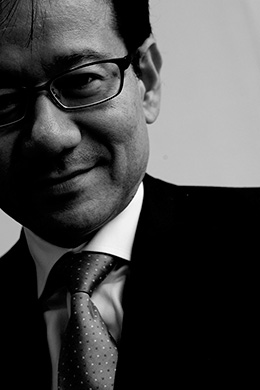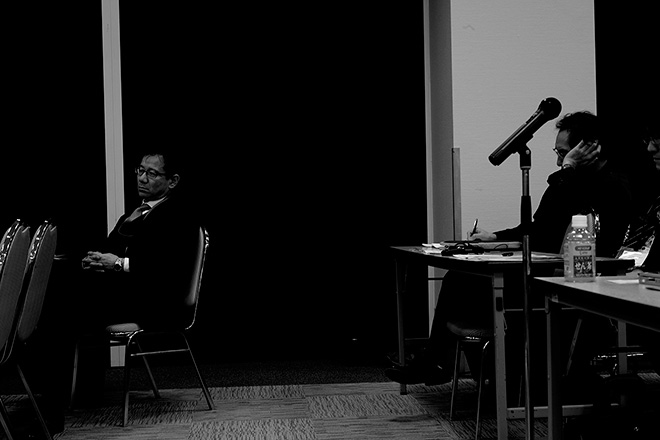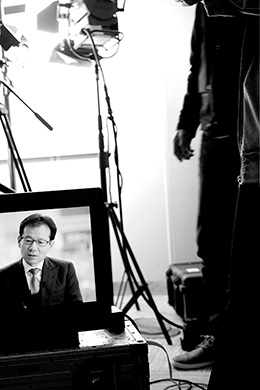
Q: After coming back to education following your experience as a vice minister in the Ministry of Education, Culture, Sports, Science and Technology, what type of program do you think is necessary to train a globally oriented workforce?
Suzuki: First of all, there is the issue of, why globally oriented people now? The Internet is widespread today, and we no longer experience the obstacle of distance, as we are able to connect with other people around the world in real time and on a daily basis. In the past ten years, globalization has progressed with remarkable speed.
I believe that as we move toward a truly global era, the state of our education must change as well.
Japan’s human resources as well as Japan itself have many good qualities. In particular, the science and technology of Japan and above all else Japan’s education and research in science are in the world’s upper echelon.
However, it is truly shameful that Japan’s potential and the Japanese themselves have not been recognized only by virtue of our poor global communication. I would like the people of the world to know more about Japan’s good qualities, and for us to then build something together with those people. I would like for people with specialized education and experience in Japanese society to perform their best and participate somewhere in this looping process.
Q: What do you consider to be the requirements of a global leader?
Suzuki: When we talk about these globally oriented human resources, we are referring to those people who will be able to collaborate in some way with others, who may speak a different language, and who may come from completely different backgrounds. Thus, leaders would be those who can bring together a truly wide variety of people into a team, and make the best use of every team member’s strengths in building something new. They would be true conductors in every sense of the word, which is what I consider these leaders to be.
I have been a big fan of music for a long time. There is a lot that I have learned from music that has proven very useful to me in my later life. To make an analogy, in Japan’s current state, it is as if some are playing their instruments out of sync while some others are playing completely different songs. However, I believe that if everyone were to take up the same composition and harmonize, we would be a truly wonderful orchestra. What we do not have enough of are capable conductors.
In a certain sense, I would like to see this GSDM turn into a training school for the conductors of society.

Thus, the question is, what are the conditions required of these conductors?
The conductor has to have a better ear than any other member of the orchestra. If one asks what characteristic of the conductor is more refined than that of the violinist or the trumpet player, it is undoubtedly the ear. Thus, I believe the primary necessity for these conductors is the ability to recognize the differences between the sounds being produced by various people, each with their own area of expertise.
If I apply this to the leaders in the society, they must be able to listen to the information being produced by various specialists from around the world—to the information born from various fields of study—and just as if they were musical timbres, the conductor must be more skilled than anyone at clearly recognizing the differences in those timbres.
In other words, we are talking about the ability to understand papers on physics, nuclear energy, and economics, as well as lectures on philosophy. It is not necessary for the conductor to be able to write such papers or give such lectures, but he/she must be able to understand them by listening or reading.
Then, there is the act of building something, in which factors such as philosophy and conceptualization are both extremely important. To engage in such an act, I think it is important to always be thinking about creation, and to also possess significant insight into history.
While this process is ongoing, an image is formed based on a single set of values, but what is difficult for the conductor here is having to take that image and put into the form of real music. Of course, even here the conductor is unable to produce a single sound on his own. He/she must have others producing the sounds for him; thus, it becomes a question of how effectively the conductor is able to communicate his image to the members of his orchestra. This ability to communicate is extremely important.

Moreover, when the orchestra itself becomes large and famous, there will be German, French, Japanese, and Chinese members. When this is the case, there will be a particular way of communicating the image to, say, a German member. For this reason, the conductor must know numerous ways to achieve the best performances out of each of his musicians. There are different performances to be elicited out of different members, and based on the member, the context, and what is to be communicated, these elicitations have to be expanded skillfully for effective communication to take place. There is also another very important form of communication, in which the conductor understands the sounds that the musicians themselves desire to make.
Then, there is also the matter of the performance—how well the conductor can finally bring out that which is shared by everyone in the orchestra. Here, rhythm, tempo, and balance are the key factors, and it is important that they must be synchronized and harmonized with one another, and the conductor is the specialist in creating the best possible relationship among them.
The role of conductor is a very interesting one as he/she is the only person who performs with his back to the audience.
That is to say, the conductor is also a representative of the audience because he/she is acting as liaison at the point of contact between the audience—perhaps it is best to call it society—society and the experts.
They are fulfilling this role of, how shall I put it? True social conductors, perhaps, or producers. This is what we would like to see them persevere and challenge themselves to do.
